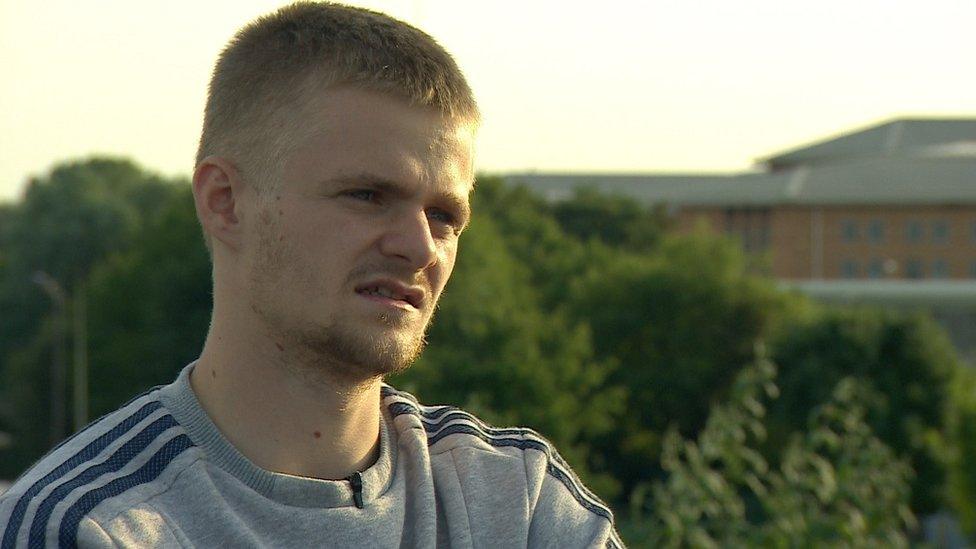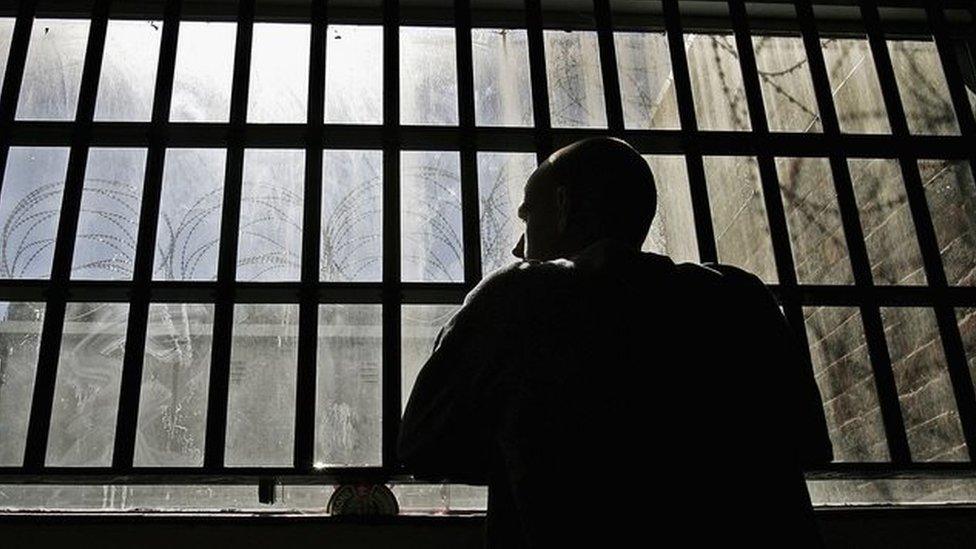The terror of young offender institutions
- Published
Ex-inmate Stephen Knight says fights happened "any time of the day"
Levels of violence in young offender institutions have been described as unacceptably high, with inmates and staff facing the daily threat of beatings and stabbings. The government is promising a thorough review of the system. But what's life like for young people who get locked up?
"Fights happened from day to day, any time of the day," says Stephen Knight. "From silly little things like tobacco being stolen or towels being misplaced, simple little petty things caused inmates to have fights all the time."
Mr Knight was one of 1,500 people imprisoned for their part in the rioting in English cities during the summer of 2011.
Aged 17, he was sent to Feltham Young Offender Institution, in west London, notorious for its levels of violence.
"When I got there it lived up to its reputation because literally every day you would see a fight, dispersing out of anywhere," Mr Knight tells the BBC's Victoria Derbyshire programme.
"Fights just happened all the time in that jail. You could go to the library and there'd be a fight.
"I know one person who made a knife using the end of a toothbrush and a razor blade attached to the top."

Young offender institutions
Introduced in England and Wales by the 1988 Criminal Justice Act, they replaced youth custody centres
House 15- to 21-year-olds who receive custodial sentences
861 people under the age of 18 were in custody in England and Wales in July, according to the latest Ministry of Justice figures

Young offender institutions were established in the late 1980s to rehabilitate 15- to 21-year-olds given prison sentences.
But critics say the facilities - which house almost 5,000 people in England and Wales - are no better than conventional prisons in preventing reoffending.
Almost three-quarters of young people released from custody commit another crime within a year, according to government data, external.
'Animal place'
And often, the critics say, conditions inside are barbaric.
"You're just sending them into a cage," says Jermaine Lawlor, a former gang member who campaigns for prison reform.
"It's an animal place, a jungle, where you have to have animal instincts to be able to survive."
The government is carrying out a review of the system, examining how young offenders are dealt with in court and the sentences available.
It is also looking at how to prevent offending and how to reintegrate children into the community after they are released.
The House of Commons Justice Committee is carrying out a separate inquiry.

Jamie Jefferson got into a brawl during his six-week sentence
At the age of 23, Jamie Jefferson, from Leeds, has 42 convictions. His criminal career has included importation of firearms, kidnap and burglary.
Aged 18, he was given a six-week prison sentence for criminal damage and sent to Doncaster prison, in South Yorkshire, which houses young offenders alongside older inmates.
Mr Jefferson wants more protection for often vulnerable youths. "Screws just sit back and watch you fight each other," he says, adding that disputes fester, with everyday objects used as weapons when trouble starts.
'Spitting glass'
"I had a fight with one guy, a 40-year-old Romanian guy," Mr Jefferson says.
"He caught me in his cell so I set about him, and it took six guys and one screw to take me off him."
Prison staff such as Paul Miller often bear the brunt of violence.
"Young offender institutions are just warehouses," says Mr Miller, who worked at Castington Young Offenders Institute, in Northumberland. "Prison officers have no control. I was beaten with a snooker ball in a sock, slashed with handmade knives."

The government is promising to make young offender institutions safer
"On one occasion," Mr Miller adds, "I remember an inmate who had broken glass in his mouth and him spitting it in my face."
The chairman of the House of Commons Justice Committee, Conservative MP Bob Neill, has expressed "serious concern" over increases in assaults on prison staff and inmates.
Former Prisons Minister Andrew Selous agrees the system is "failing young offenders". "Prison is meant to do two things: punish and rehabilitate," he says, "but prisons are failing on both counts."
The charity Inquest, external, which helps relatives of people who die in custody, says there have been 274 suicides among young offenders since 1990.
A Ministry of Justice official accepts the "level of violence in our prisons is unacceptable - especially violence against our hard-working and dedicated prison staff".
Safety will be a "vital part of our reform plans", they add, saying: "We have resources in place to deal with violent or abusive behaviour.
"Any prisoners involved could face disciplinary action and be referred to the police."
But Mr Jefferson questions whether young offender institutions can ever improve, unless the whole philosophy changes - providing tuition and guidance rather than locking up inmates for long periods.
"It's mentally disturbing because you're in a cell for 21 hours a day," he says, "doing nothing but staring at all four walls."
The Justice Committee's report on treatment of young offenders is due out next month, while the government's is expected in the next few months.
The Victoria Derbyshire programme is broadcast on weekdays between 09:00 and 11:00 on BBC Two and the BBC News channel.